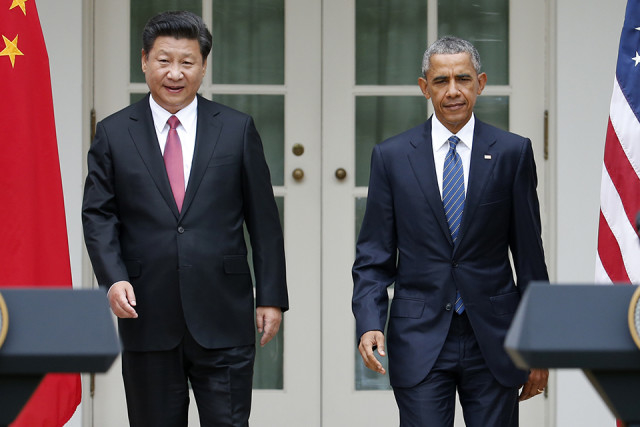Good etiquette is the key to a successful diplomatic visit, because at its heart it symbolizes respect, said Pamela Eyring, the president of the Protocol School of Washington.
A successful state visit takes great planning to ensure that cultural differences are understood and world leaders and their guests have the best experience during the visit.
The protocol for the current state visit by China’s President Xi Jinping to the United States was established months ago, with both sides meeting to hash out the fine details. Here’s more information on what etiquette is expected for the visit:

Advanced prep
Everything from what to expect during the visit, who to invite as guest, and when media are allowed to take pictures, are discussed by the protocol departments from both countries, Eyring said. Presidents are guided during ceremonies to exactly where to stand and who to stand next to, she added.
Both sides also know in advance what type greeting to expect. So U.S. President Barack Obama’s greeting of “ni hao” or “hello” in Chinese on Friday morning was surely expected. President Xi was also likely told when to bow and on what side he and his delegation are to stand, Eyring said.
Security officials from both sides have also met several times in advance to understand each environment that the leaders will be in at every step of the visit, Eyring said.
Ceremony of the south lawn
When their plane lands in Washington D.C., Xi and China’s first lady will be transported to the south lawn of the White House, where they will meet the Obamas for the first time during this visit.
The Blair House
Located across from the White House, the Blair House serves as the U.S. president’s guest house for visiting foreign leaders. Before the Blair House was purchased in 1942, guests of the president customarily spent a night in the White House, followed by a hotel or embassy for the remainder of their visit. Former U.K. Prime Minister Winston Churchill’s frequent trips to Washington helped convince President Franklin Roosevelt of the need for official diplomatic housing, the Blair House website said.
Xi and Obama met, talked, and dined at the Blair House on the first night of Xi’s arrival in Washington D.C.
State dinner
The state dinner is the most formal event during a state visit. State leaders and guests are in black tie attire or long evening dresses with gloves. Guests will likely include celebrities and government officials. The highlight of the dinner will be the entertainment and menu. Classical musicians will likely walk around the tables, playing music for participants, this is known as the “strolling strings.”
“They’ll also take into consideration President Xi and his wife’s dietary restrictions, or if they have allergies,” Eyring said. “That’s important to know.”
State lunch
Though there is no state lunch scheduled for Xi’s visit, a state lunch is a less-formal event than a state dinner. The dress code is typically business suits for men and dresses for women. The lunch is sometimes followed by a tour of the diplomatic rooms at the state department, Eyring said.
Sporting events
If the leaders are very close, they may even attend or take part in sporting events, such as hunting and playing golf, Eyring said. No such event is scheduled for Xi’s visit.
Gift exchanges
The propose of exchanging gifts is to increase the bonds of the relationship between the two countries. Gift-giving is an art form, especially that between two states. The No. 1 must for a state visit gift is that the gift has a unique quality, Eyring said. Giving the same gift to two leaders or the same leader is considered disrespectful, she added.
Representatives from both sides have worked to make sure gifts are above reproach, Eyring said.
In some cultures receiving a knife could cause separation in a relationship, Eyring said. A clock can also be a bad choice because it could mean that time is running out, she added.
A gift should also be portable, allowing the visiting delegation to transport it back home easily. Any gift that is too personal, such as clothing or jewelry, is also not appropriate, she said.
The color of the gift is significant, as is the color of the container it’s in and the wrapping around it, she added. Staff will ensure that the wrapping and container are not in a color that is too similar to the national flag of each country, she said.
 CGTN America
CGTN America In this file photo, Presidents Barack Obama and Xi Jinping arrive for their joint new conference, Friday, Sept. 25, 2015, in the Rose Garden of the White House in Washington. (AP Photo/Evan Vucci)
In this file photo, Presidents Barack Obama and Xi Jinping arrive for their joint new conference, Friday, Sept. 25, 2015, in the Rose Garden of the White House in Washington. (AP Photo/Evan Vucci)
